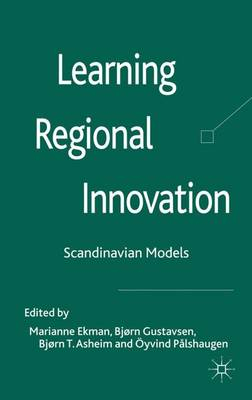

Learning Regional Innovation
- Utgiven: 2010
- ISBN: 9780230275607
- Sidor: 300 st
- Förlag: Palgrave Macmillan
- Format: Inbunden
- Språk: Engelska
Om boken
While the distinction between science driven and experience driven innovation is well known and much commented on, the point that experience driven innovation demands broad participation, not only within the individual enterprise but across the whole labour market, is less well recognized. When innovation first started to attract attention, the focus was on how to create innovation. In the light of the current crisis, a new question has entered the agenda: how to create socially responsible innovation? Participation and social responsibility in innovation are the core themes of this book. The main argument is that both are issues of organization and not of, say, ethics, or the enforcement of other forms of obligations on individual actors. The need is for a democratization of innovation that can make innovation open to broad participation, scrutiny from many positions, and influence from different interest groups without, however, losing the forward momentum. The organization of processes that can carry forward socially responsible innovation is, in turn, dependent upon public-private co-operation.This needs, however, to be a co-operation that expresses itself in terms of joint development processes, not traditional regulation. Combining experience driven innovation, broad participation and development oriented public-private co-operation, this book demonstrates that Scandinavia offers a unique arena of experience. It is a further argument that insofar as there is a 'systems response' to the present crisis, it lies in the direction of broader diffusion of this kind of pattern. Since the arguments of this book are built on practical experience, it does not seek to establish a set of abstract 'musts' without views on implementation, but rather points at the processes that can be initiated to create movement in the right direction
Åtkomstkoder och digitalt tilläggsmaterial garanteras inte med begagnade böcker
Mer om Learning Regional Innovation (2010)
I december 2010 släpptes boken Learning Regional Innovation skriven av Marianne Ekman, Bjrn Gustavsen, Bjrn Terje Asheim, Yvind Plshaugen. Den är skriven på engelska och består av 300 sidor. Förlaget bakom boken är Palgrave Macmillan som har sitt säte i London.
Köp boken Learning Regional Innovation på Studentapan och spara pengar.
Referera till Learning Regional Innovation
Harvard
Ekman, M., Gustavsen, B., Asheim, B. T. & Plshaugen, Y. (2010). Learning Regional Innovation. Palgrave Macmillan.
Oxford
Ekman, Marianne, Gustavsen, Bjrn, Asheim, Bjrn Terje & Plshaugen, Yvind, Learning Regional Innovation (Palgrave Macmillan, 2010).
APA
Ekman, M., Gustavsen, B., Asheim, B. T., & Plshaugen, Y. (2010). Learning Regional Innovation. Palgrave Macmillan.
Vancouver
Ekman M, Gustavsen B, Asheim BT, Plshaugen Y. Learning Regional Innovation. Palgrave Macmillan; 2010.
